|
|
|
Sort Order |
|
|
|
Items / Page
|
|
|
|
|
|
|
| Srl | Item |
| 1 |
ID:
125113
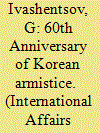

|
|
|
|
|
| Publication |
2013.
|
| Summary/Abstract |
ON JULY 27, 2013, it will be 60 years since the Armistice Agreement was signed in the village of Panmunjom, putting an end to the three-year Korean War. That war, which has become the bloodiest and most devastating military conflict since the end of World War II, remains an unhealed wound for the Koreans while its consequences are still making an impact on the international situation in Northeast Asia and beyond.
|
|
|
|
|
|
|
|
|
|
|
|
|
|
|
|
| 2 |
ID:
115095
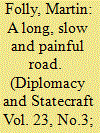

|
|
|
|
|
| Publication |
2012.
|
| Summary/Abstract |
The Second World War Anglo-American alliance was less cohesive on the political side than the military. There were widening divergences between Britain and the United States with regard to the best way to handle co-operation with the Soviet Union during 1944. Some shared assumptions about the motivations of Soviet policy existed, but British and American policy-makers not only formulated different approaches, they consistently viewed their own to be more successful than those of their ally. There was an opportunity to co-ordinate polices during American Under-Secretary of State Edward Stettinius's mission to London in April 1944 but the fact that the issue was barely discussed is symptomatic of the situation. The British Foreign Office gained the backing of Winston Churchill in an attempt to forge ahead with pragmatic arrangements with the Russians. A satisfaction with their own efforts on both sides meant that the British and American bureaucracies made no serious and sustained attempt to co-ordinate their policies towards the Soviet Union through 1944, in contrast to the closeness of co-operation in other areas.
|
|
|
|
|
|
|
|
|
|
|
|
|
|
|
|
| 3 |
ID:
114998
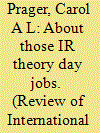

|
|
|
|
|
| Publication |
2011.
|
| Summary/Abstract |
Chris Brown's invitation in 'IR Theory in Britain - the New Black?' to consider whether theory's pre-eminence in British IR is warranted appears to have gone unheeded. He asks whether the consuming preoccupation with theory can be justified or will turn out to be as transitory as the 'new black' soon to be supplanted by the next 'new black'. There are many possible explanations for the neglect of Brown's views, but whatever the reason, epistemology can provide some answers. It draws attention to the applied aspect of IR theory as well as the nature of theory's relations with the rest of the discipline, buttressing Brown's arguments to this effect. I go further to ask whether theory's place is not ultimately best seen as one element in an approach not unlike classical redux.
|
|
|
|
|
|
|
|
|
|
|
|
|
|
|
|
| 4 |
ID:
086855
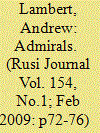

|
|
|
|
|
| Publication |
2009.
|
| Summary/Abstract |
Historically, the job of the admiral was to make high level decisions that affected the conduct of war, or the preservation of peace, far from home, and without access to the advice of kings or queens, statesmen and ministers. This article charts the necessary qualities and gifts of successful British admirals throughout the ages.
|
|
|
|
|
|
|
|
|
|
|
|
|
|
|
|
| 5 |
ID:
143234
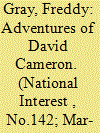

|
|
|
|
|
| Summary/Abstract |
“BRITAIN HAS got its mojo back,” said the British Chancellor of the Exchequer George Osborne on December 7. He wasn’t doing an impression of Austin Powers. He was speaking to the Council on Foreign Relations about the British Parliament’s decision to bomb ISIS in Syria. Osborne explained to the council that he and the prime minister, his close friend and ally David Cameron, had tried to intervene militarily in Syria two years earlier and had been rebuffed by the House of Commons. “It was quite a striking moment,” he recalled, with sadness. “It was a moment when Britain was unable to follow the lead asked of it by our prime minister and the government.” But George Osborne felt better because now Britain was dropping bombs over Syria—for him a “source of real pride.”
|
|
|
|
|
|
|
|
|
|
|
|
|
|
|
|
| 6 |
ID:
122234
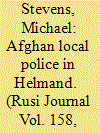

|
|
|
|
|
| Publication |
2013.
|
| Summary/Abstract |
As the end of the British combat role in Helmand approaches, the Afghan Local Police are coming under increasing scrutiny. In the time remaining, British and US mentors are working to reinforce this fragile pillar of the Afghan National Security Forces, knowing that the potential for dramatic success is balanced against the risk of serious failure.
|
|
|
|
|
|
|
|
|
|
|
|
|
|
|
|
| 7 |
ID:
027400
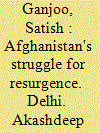

|
|
|
|
|
| Publication |
DelhI, Akashdeep Publishing House, 1989.
|
| Description |
xvii, 345p.hbk
|
| Standard Number |
8171580238
|
|
|
|
|
|
|
|
|
|
|
|
Copies: C:1/I:0,R:0,Q:0
Circulation
| Accession# | Call# | Current Location | Status | Policy | Location |
| 031258 | 958.104/GAN 031258 | Main | On Shelf | General | |
|
|
|
|
| 8 |
ID:
119450
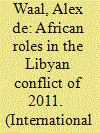

|
|
|
|
|
| Publication |
2013.
|
| Summary/Abstract |
Libya's relationship with sub-Saharan Africa has been complex, troubled and misunderstood, both during the rule of the late Libyan leader Muammar Gaddafi and the conflict that culminated in his overthrow and death. The Libyan conflict of 2011 divided Africa, but nonetheless the African Union (AU) was able to agree on a political strategy aimed at achieving a negotiated settlement and power transition.
The AU's peace initiative was launched in March 2011 and, contrary to widespread perception that the AU sought to prop up Gaddafi, it offered a credible and balanced option of a negotiated solution. United Nations Security Council resolution 1973 expressed support for the initiative, but in the event France, Britain and the United States blocked its chances of success.
This article draws on evidence and analysis provided by the AU officials involved. It details the process whereby the AU adopted and implemented its decisions, and describes the AU's diplomatic engagement with Gaddafi and the National Transitional Council. The article also draws on information provided by Sudanese military and intelligence officials, providing an account, hitherto untold, of how the Sudanese government supported the Libyan opposition with military supplies, training and intelligence, in tacit cooperation with NATO countries.
The article concludes with reflections on how the Libyan conflict has had an impact on the doctrine of the 'responsibility to protect', on the AU, and on Libya's relations with Africa.
|
|
|
|
|
|
|
|
|
|
|
|
|
|
|
|
| 9 |
ID:
034567


|
|
|
|
|
| Publication |
Moscow, Progress Publishers, 1966.
|
| Description |
376p.Hbk
|
|
|
|
|
|
|
|
|
|
|
|
Copies: C:1/I:0,R:0,Q:0
Circulation
| Accession# | Call# | Current Location | Status | Policy | Location |
| 032519 | 923.147/LEN 032519 | Main | On Shelf | General | |
|
|
|
|
| 10 |
ID:
087276
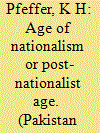

|
|
|
|
|
| Publication |
2009.
|
| Summary/Abstract |
Nationalist Europe of the 19th and 20th centuries was more progressive that the rulers and peoples of Africa and Asia, who until then lived in a pre-nationalist are of feudalism or tribalism. Similarly, now the contention is that the counries and peoples of Africa and Asia are passing through a historic phase which Europe has already left behind.
|
|
|
|
|
|
|
|
|
|
|
|
|
|
|
|
| 11 |
ID:
184840
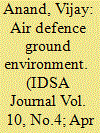

|
|
|
| 12 |
ID:
051066


|
|
|
|
|
| Publication |
London, Frank Cass, 2002.
|
| Description |
xix, 362p.
|
| Series |
Studies in air power
|
| Standard Number |
0714682578
|
|
|
|
|
|
|
|
|
|
|
|
Copies: C:1/I:0,R:0,Q:0
Circulation
| Accession# | Call# | Current Location | Status | Policy | Location |
| 048001 | 358.4009/COX 048001 | Main | On Shelf | General | |
|
|
|
|
| 13 |
ID:
032956
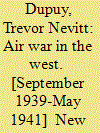

|
|
|
|
|
| Publication |
New York, Franklem Watts, Inc., 1963.
|
| Description |
76p.Hbk
|
| Series |
Military History of World War II
|
| Contents |
Vol. VI
|
|
|
|
|
|
|
|
|
|
|
|
Copies: C:1/I:0,R:0,Q:0
Circulation
| Accession# | Call# | Current Location | Status | Policy | Location |
| 008098 | 940.54/DUP 008098 | Main | On Shelf | General | |
|
|
|
|
| 14 |
ID:
032107
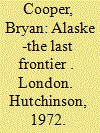

|
|
|
|
|
| Publication |
London, Hutchinson, 1972.
|
| Description |
248p.: ill., maps, chartshbk
|
| Standard Number |
0091109701
|
|
|
|
|
|
|
|
|
|
|
|
Copies: C:1/I:0,R:0,Q:0
Circulation
| Accession# | Call# | Current Location | Status | Policy | Location |
| 010304 | 979.8/COO 010304 | Main | On Shelf | General | |
|
|
|
|
| 15 |
ID:
142417
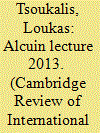

|
|
|
| 16 |
ID:
103767
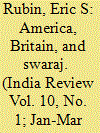

|
|
|
|
|
| Publication |
2011.
|
| Summary/Abstract |
In the years before and during the Second World War, the Roosevelt Administration played an important and often overlooked role in encouraging Britain's disengagement from the Indian subcontinent. Roosevelt's motivations in pressing for Indian independence were varied. They included a mix of principled opposition to colonialism, practical concern for the outcome of the war and pragmatic jockeying for influence with post-colonial nations when the war was won. Churchill's government was wary of being pushed by Washington to move more quickly to "quit India" than it thought prudent. U.S. policy and actions clearly influenced the direction of events toward independence, but U.S. caution as the war ground on led to disillusionment among nationalist leaders. This reaction would have consequences once swaraj was won and India came into its own, at a time when the Cold War was becoming the dominant factor in America's view of the world.
|
|
|
|
|
|
|
|
|
|
|
|
|
|
|
|
| 17 |
ID:
089216
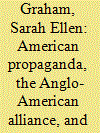

|
|
|
|
|
| Publication |
2009.
|
| Summary/Abstract |
While highly sensitive to embarrassment by us, the British exhibit a distressing lack of sympathy for the discomfiture to which we are exposed because of our association with them.1
Being for the most part abysmally ignorant, [Americans] are convinced that, as a result of the British Empire being kept together, the toilers of overseas are burdened with taxes for the benefit of the degenerate dukes in the metropolis.2
The close diplomatic relationship between Britain and the United States during the Second World War continues to inspire historical interest, much of it coalescing around the mixture of cooperation and discord that underscored the relationship. The received historical view is that the most significant disagreement between the Atlantic powers was the future of the colonial order in general and the status of the British Empire most especially. Washington and London's fundamental antagonism over the principles of postwar trusteeship and self-determination emerges virtually as a historiographical truism, evidenced by the florid and deeply divergent rhetorical positions taken by U.S. President Franklin D. Roosevelt and British Prime Minister Winston Churchill themselves.3 Turning to America's relationship with the objects of decolonization, however, it is evident that in many cases the U.S. commitment to freedom for oppressed peoples did not live up to the ideals espoused. From this angle, the Anglo-American disagreement over colonialism opens broader questions about the sources of U.S. foreign policy itself and the political constraints of its implementation. Did American strategic imperatives outweigh ideals that were genuinely held in the case of colonial self-determination? Was the rhetoric of decolonization purely instrumental? Or, as Michael H. Hunt has contended, was the "ideology" of U.S. foreign policy multifaceted, incorporating notions of racial hierarchy and an antipathy to revolutionary change as well as the much-valorized commitment to freedom, such that decision makers were at key moments highly amenable to the colonial status quo?
|
|
|
|
|
|
|
|
|
|
|
|
|
|
|
|
| 18 |
ID:
161666


|
|
|
|
|
| Summary/Abstract |
Representative democracies require sufficient numbers of citizens to put themselves forward as candidates for political office. Existing studies have shown that political institutions are not representative of the population as a whole, suggesting that political ambition is not evenly distributed across all potential candidates. We discuss evidence from the first systematic study of political ambition in Britain, examining the question of who is interested in putting themselves forward for political office. We find patterns in the distribution of political ambition that help to explain why British political institutions do not look like the British people as a whole and include a gender gap, a social class gap, an education gap, a north–south divide, and a personality gap. We discuss the implications of our findings for political parties, arguing that they need to adjust practices of candidate recruitment in such a way that minimises the effects of these biases.
|
|
|
|
|
|
|
|
|
|
|
|
|
|
|
|
| 19 |
ID:
126723
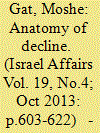

|
|
|
|
|
| Publication |
2013.
|
| Summary/Abstract |
Following the Suez Campaign the British government found itself facing Moscow and its bid for power in the Middle East. The Soviets, for their part, exploited London's weakness to extend and consolidate their influence in the Arab world. By taking advantage of the Arab-Israeli conflict, by maintaining an (un)reasonably high level of regional tension, Moscow sought to make the Arabs totally dependent on its support. It began supplying the Arabs with weapons and providing them with diplomatic support, acquiring in the process a regional status equal to that enjoyed by the West. This in turn meant that any attempt by Britain to come to some kind of an understanding, such as limiting arms sales to the Middle East, had virtually no chance of success. Having mobilized what little remained of its power to try and check the Soviet advance, Britain was finally forced admit that it was no longer up to the task.
|
|
|
|
|
|
|
|
|
|
|
|
|
|
|
|
| 20 |
ID:
119725
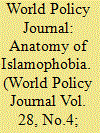

|
|
|
|
|
|
|
|